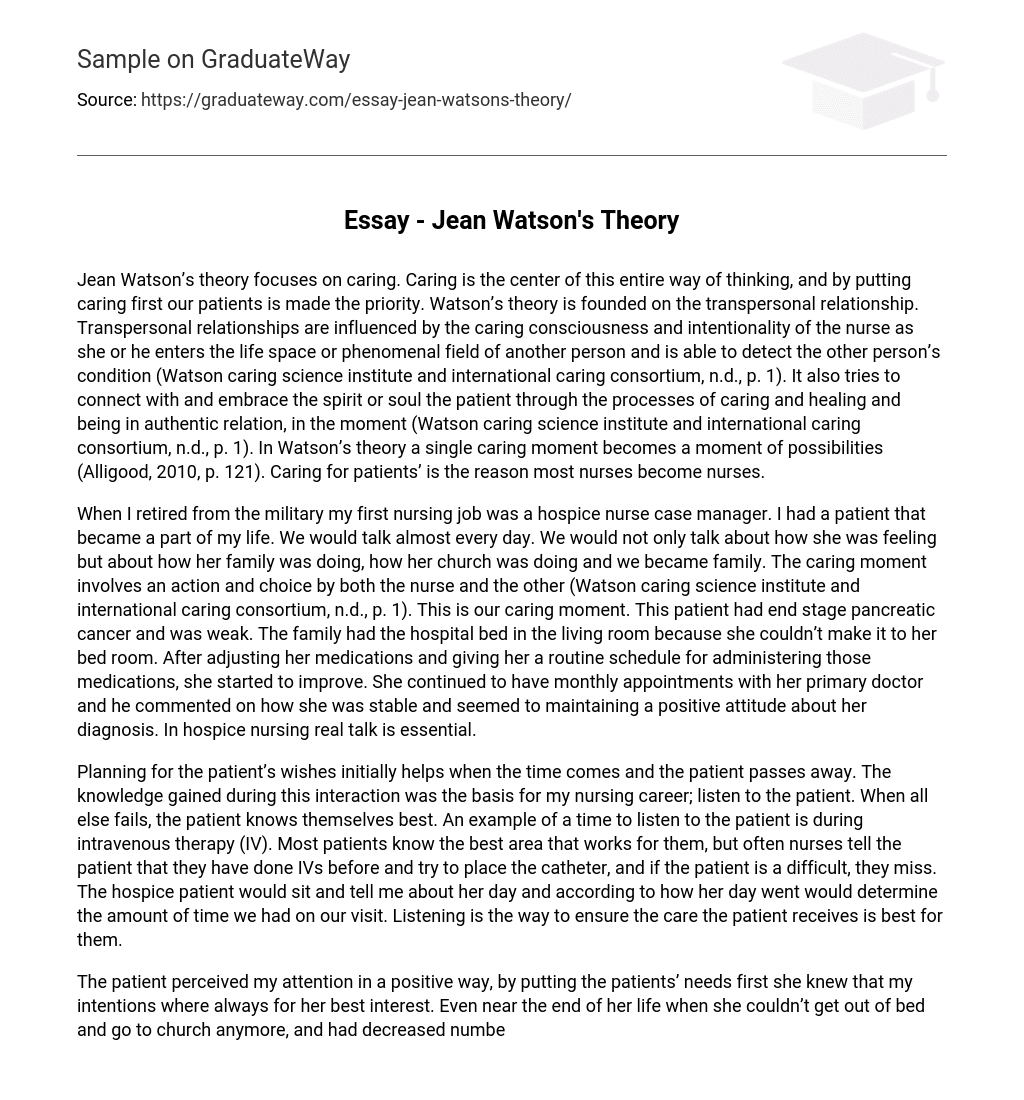Jean Watson’s theory focuses on caring. Caring is the center of this entire way of thinking, and by putting caring first our patients is made the priority. Watson’s theory is founded on the transpersonal relationship. Transpersonal relationships are influenced by the caring consciousness and intentionality of the nurse as she or he enters the life space or phenomenal field of another person and is able to detect the other person’s condition (Watson caring science institute and international caring consortium, n.d., p. 1). It also tries to connect with and embrace the spirit or soul the patient through the processes of caring and healing and being in authentic relation, in the moment (Watson caring science institute and international caring consortium, n.d., p. 1). In Watson’s theory a single caring moment becomes a moment of possibilities (Alligood, 2010, p. 121). Caring for patients’ is the reason most nurses become nurses.
When I retired from the military my first nursing job was a hospice nurse case manager. I had a patient that became a part of my life. We would talk almost every day. We would not only talk about how she was feeling but about how her family was doing, how her church was doing and we became family. The caring moment involves an action and choice by both the nurse and the other (Watson caring science institute and international caring consortium, n.d., p. 1). This is our caring moment. This patient had end stage pancreatic cancer and was weak. The family had the hospital bed in the living room because she couldn’t make it to her bed room. After adjusting her medications and giving her a routine schedule for administering those medications, she started to improve. She continued to have monthly appointments with her primary doctor and he commented on how she was stable and seemed to maintaining a positive attitude about her diagnosis. In hospice nursing real talk is essential.
Planning for the patient’s wishes initially helps when the time comes and the patient passes away. The knowledge gained during this interaction was the basis for my nursing career; listen to the patient. When all else fails, the patient knows themselves best. An example of a time to listen to the patient is during intravenous therapy (IV). Most patients know the best area that works for them, but often nurses tell the patient that they have done IVs before and try to place the catheter, and if the patient is a difficult, they miss. The hospice patient would sit and tell me about her day and according to how her day went would determine the amount of time we had on our visit. Listening is the way to ensure the care the patient receives is best for them.
The patient perceived my attention in a positive way, by putting the patients’ needs first she knew that my intentions where always for her best interest. Even near the end of her life when she couldn’t get out of bed and go to church anymore, and had decreased number of visits with her primary care physician because there was nothing else medically that could be done, she knew every adjustment that was made to her medications and treatment was all to make her last days the best they could be. Showing the patient that she was my only concern and that listening to her was the main goal, made her last days with her family a blessing. Hospice nursing takes a special type of person. Watson’s theory is the key to this type of specialized nursing.
Transpersonal caring calls for an authenticity of being and becoming, an ability to be present to self and other in a reflective frame; the transpersonal nurse has the ability to center consciousness and intentionality on caring, healing, and wholeness, rather than on disease, illness and pathology (Watson caring science institute and international caring consortium, n.d., p. 1). True hospice nurses do this with every patient on every nursing visit. This caring moment could have been enhanced by explaining more to the family what to expect during the last days of the patient’s life. If more instructions and examples were given the family would have understood the process and not taken the patient to the hospital at the end. I was away on vacation when the patient finally passed away, and the family called the ambulance and had her taken in.
Looking back, I think the family never had any intentions of her passing away at home, but they wanted her to be as comfortable as possible at home until her final days. If more of that information had been shared then a clear plan of her wishes could have been put in place and confusion avoided. The relationship with the family was very open, but information was still not fully disclosed. More family conferences could have helped all parties express themselves and clear up any confusion about the process. .
Referring to the metaparadigm concept which includes human being, health and nursing are all relevant to this nursing care moment. The human being was the person of value cared for, understood, nurtured and respected. Her health was viewed with unity and harmony of mind, body and soul. This was achieved by concern for her spiritual as well as physical well-being. The science of the persons heatlh-illness experience that are mediated by professional, personal, scientific and the ethical care interactions (Jean Watson: Caring Science, n.d., p. 1). Caring is the part of nursing that separates this profession from others. Nursing is a profession of dedicated individuals focused on meeting their patient’s needs and in doing so creating a positive experience for the patient and the caregivers.
References
Alligood, M. R. (2010). Nursing theory: Utilization and application (4th ed.). Maryland Heights, MO: Mosby Elsevier. Jean Watson: Caring Science. (n.d.). www.jeanwatsoncaringscience.weebly.com/theory-description.html Watson caring science institute and international caring consortium. (n.d.). www.watsoncaringscience.org/about-us/caring-science-definitions-processes-theory





